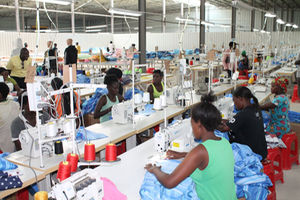
Uganda’s target market for her exports begins with its neighbours in the East African Community (EAC), the Common Market for Eastern and Southern Africa (COMESA) and the next target market is Europe and the Middle East. PHOTO/FILE
While meeting traders at Kololo Ceremonial Grounds, President Yoweri Museveni told them to focus on manufacturing rather than importing finished products, adding that Uganda was not going to be a supermarket for foreign products, but must produce for export.

President Yoweri Museveni meets traders at Kololo Ceremonial Grounds in May. PHOTO/MICHAEL KAKUMIRIZI
Presenting the Budget speech recently, Finance Minister Matia Kasaija said in the new financial year starting July 1, 2024, the government will implement two programmes namely; the Generating Growth Opportunities and Productivity for Women Enterprises (GROW) worth Shs824 billion (USD 217 million); and the “Investment for Industrial Transformation and Employment (INVITE)” worth Shs800 billion ($210 million). These funds are aimed at supporting women-owned enterprises and value addition for exports.
According to Mr Kasaija, in the financial year ending June 30, 2024, Uganda imported goods worth $12.9 billion (Shs48 trillion) compared to $10.3 billion (Shs38 trillion) in the year ending April 2023. This increase in imports was largely driven by an increase in private sector imports of 23 percent, mainly to develop our nascent oil and gas sector.
On May 7, this year, when traders met the president and sought his intervention on the high taxes levied on imports, his assertion was that, that is putting him under unnecessary pressure as “most of those nations, for example, those in Europe do not allow us to sell our agricultural produce and manufactured products, despite tasting better than what they have on market.”
To fully benefit from their businesses, Museveni advised traders to choose the right enterprises by focusing on local manufacturing and exporting.
In an interview with Prosper Magazine on what is being done to get market for Uganda’s products, Mr Elly Twineyo, the chief executive officer, of Uganda Export Promotion Board, says they are linking buyers directly to producers.
They help Ugandan exporters understand international contracting, negotiations, drafting agreements.
“We have people both in urban and rural areas in agriculture, agro industry and in manufacturing who do not know where the buyers are, or are moving in many places searching for a market and we rely on going for trade fairs or asking other people to help them find a market,” Mr Twineyo says.
The Export Promotions Board will rely on Uganda’s embassies and missions, which will invest in market research and get buyers who will be linked to producers in the country.
“We are going to do this sector by sector in the target markets, for example, fruits and vegetables, cocoa or fish and its products among others,” Mr Twineyo says.
Mr Twineyo says Uganda’s target market begins with its neighbours in the East African Community (EAC), the Common Market for Eastern and Southern Africa (COMESA) and the next target market is Europe and the Middle East, specifically the United Arab Emirates.
Uganda will gradually add on other markets such as India, China and USA.
Breakthroughs
On the issue of breakthroughs made as far as export trade is concerned, Mr Twineyo says linking producers to buyers has worked for certain products such as fruits and vegetables, cocoa and commercial tourism products which include; cultural products and crafts, among others.
“We want to encourage companies which come from target markets to do production from here, for their markets,” Mr Twineyo says.
Acknowledging the challenges of entering global value chains, the Export Promotion body attracts investors and companies to produce for international markets, streamlining the process for greater accessibility.
The Export Promotion Board, in collaboration with free zones under the Trade Ministry, will facilitate access to these zones. This will attract companies to produce within these enclaves, directly targeting exports.
The other approach, according to Mr Twineyo, is to begin encouraging producer groups and cooperatives to export directly.
Organised cooperatives in developing countries facilitate seamless connections with foreign buyers. These groups manage both quantity and quality, negotiate on behalf of their members, and oversee the export process. By adopting this approach, many developing nations have successfully boosted their export trade.
He says the fourth is value addition and manufacturing, where they will come up with a product specifically for the export market.
He adds that still they continue with Commercial diplomacy, engaging in promotional events, specialist trade fairs, business conferences and establishing Memoranda of Understanding with government agencies such as Uganda National Chamber of Commerce and Industry, among others.
According to Ms Evelyn Anite, the State Minister for Investment and Privatisation, to push Uganda’s industrialisation agenda, they have provided land to manufacturers at no cost, addressing a critical factor of production and ensuring that land availability is no longer a barrier.
Government acquired land in 25 different locations for industrial parks. This land is given out out freely depending on the size of what the manufacturer wants to set up.
Other than that, she says they have made it available for businesses to access credit for manufacturing. She explains that, if people go to the Commercial Banks and want money for trade in real estate, they will get it at 25 percent, but money for manufacturing, they brought it down at 12 percent and that is in UDB among others.
Furthermore, she says they have tax incentives. A Ugandan who has invested up to $300,000, is exempt from paying corporation tax or Income tax for 10 years.
Mr Morrison Rwakakamba, the executive chairperson of the Uganda Investment Authority says, what they are doing in the business environment, to make sure that manufacturing thrives in this country, in 2021 at the Kampala Industrial Business Park, Namanve in Mukono district they only had 21 factories but now, they are 440 factories.
According to him, most of them are largely processed for import substitution. Most of the products in Uganda’s supermarkets - 60 percent are the fast-moving consumer goods manufactured in the country.




